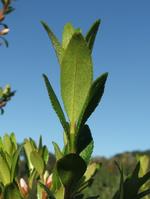
Buchu (‘boegoe’ in Afrikaans) is a generic name for members of the aromatic Rutaceae family and is prized for its medicinal properties worldwide.
Used in South Africa for centuries by the San and Khoi people to combat digestive complaints, fever and rheumatism it is now a prized ingredient in the medicinal and food industries.
The early settlers in South Africa steeped the leaves in vinegar and brandy and used it for indigestion, worms and stomach complaints.
Only two species Agathosma crenulata (long-leaf buchu) and Agathosma betulina (round leaf buchu) have commercial value for their oil. The yield is about 1-2% of the fresh material. The extracted oil is used in cosmetics, as a fragrance (to induce a blackcurrant flavour) and as food colourants.
Medicinally it is used to treat kidney disorders and chest complaints. Buchu is also an excellent anti-inflammatory and is used in topical ointments, sold as buchu water or as a pure oil.
The plant's leaves are natural detox agents and provide natural relief for menstrual cramps and bloating. Buchu Oil enjoys a GRAS status - generally accepted as safe - by both the FDA and European Union.
Due to the high price of the oil and threat to wild colonies, farmers have started growing buchu as a commercial crop. Buchu is endemic to the lower slopes of the mountains of the Western Cape. Commercially there are plantings in Piketberg, Citrusdal and Cedarberg. Buchu prefers sandy, well-drained acidic soils and can be grown from seed.
Medical Disclaimer
Information is for educational and informational purposes only and may not be construed as medical advice. The information is not intended to replace medical advice or treatment offered by healthcare professionals.By Marinda LouwFor bulk or Buchu Oil export enquiries please use the enquiry link below.